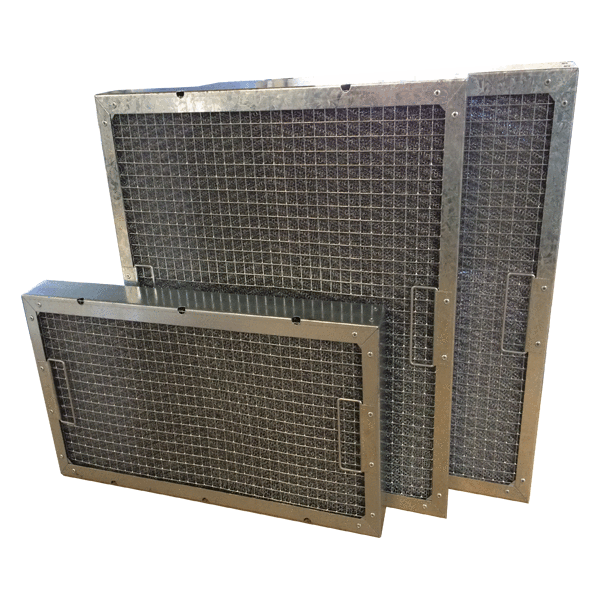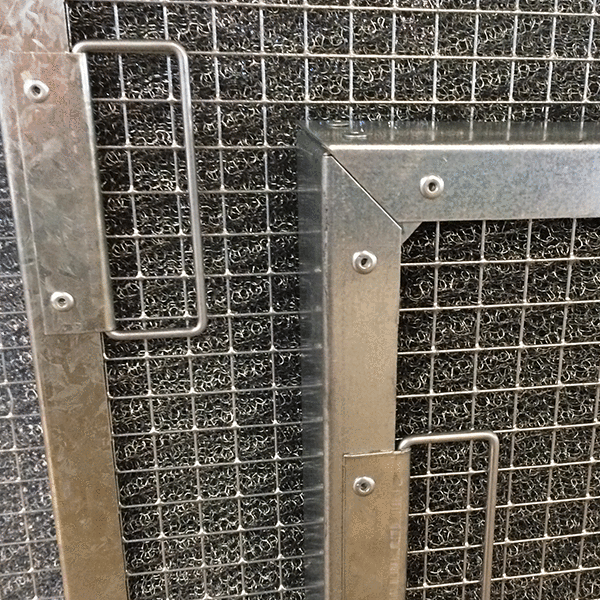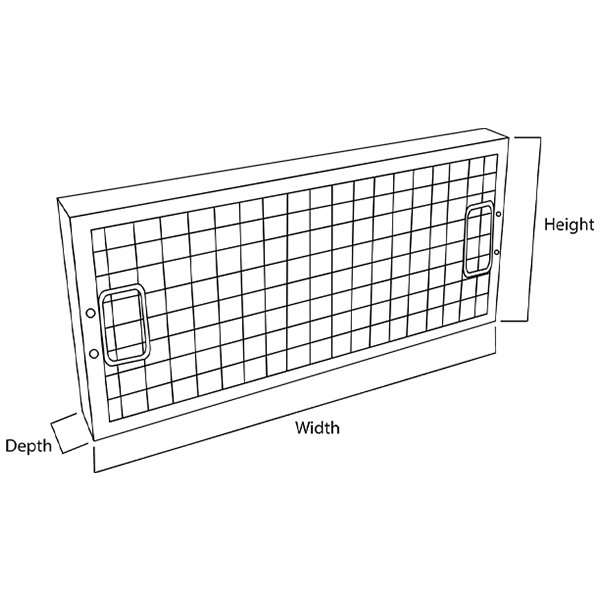Mesh Grease Filters
Stainless Steel & Galvanised Steel
for Kitchen Extracts and Canopies
– Quality Mesh Grease Filters manufactured from Galvanised Steel for Kitchen Canopies
– Manufactured in Kent in Standard and Non Standard sizes to suit your canopy
– Effective Grease removal from commercial kitchens
– Cleanable and Long Lasting Grease Filter
– Galvanised or Stainless Steel Knitted Wire Options
– Galvanised Steel Frames as Standard
– Aluminium Frames available upon request
– Handles and Grease Drain Holes included
– Heavy Duty Filtration Options Available
Applications
Mesh Grease Filters are generally installed in the kitchen canopy above cooking ranges, fryers, and gas hobs in commercial restaurant kitchens. These air filters effectively eliminate or greatly reduce grease build up in duct work and on fans in the kitchen extract system.
Mesh Canopy Filters significantly reduce the frequency of expensive duct cleaning, and offer some protection against grease-fire hazards.
Airclean now have many thousands of mesh grease filters operating satisfactorily in leading restaurants, hotel kitchens and ship’s galleys.
Description
The grease filtration media is a crimped galvanised or stainless steel knitted wire mesh, that is enclosed in either an aluminium or galvanised channel frame. Galvanised steel or stainless steel retaining meshes are fitted to both faces of the grease filter, and corner plates provide rigidity.
Handles are normally desirable on grease filters for ease of removal and cleaning, but these are optional. Drain holes also provide an outlet for grease to drain away from the filter into drain trays and grease traps.
For Heavy Duty Stainless Steel Mesh Type Grease Filters are available, and these can be found as our Gridmesh Style Grease Filter. See AC3.4 Stainless Steel Gridmesh Grease Filters for further information.
For information on the New Style Baffle Grease Filters Click Here.
Technical
Filter Classification : Grade G2/G3 to EN779
Maximum Operating Temperature : 100°C (212°F)
Maximum Recommended Face Velocity 2.5 m/s
Standard Filter Depths/Thickness: 47mm, 22mm, 12mm
Mesh Grease Filter Selection Tables
Our selection tables show our standard sizes only. For non Standard dimensions, or trade sales please contact our technical sales team – 01622 832777
For Non Standard Sizes please contact on 01622 832777 or fill in the contact form below:
For Non Standard Sizes please contact on 01622 832777 or fill in the contact form below:
FAQ - Mesh Grease Filters
A Mesh Grease Filter is manufactured with a tightly packed, crimped wire pad encased in two welded mesh facias. As the air passes through the wire pad, filtration mechanisms including Sieving, Interception, and inertial impaction come into play to remove the large grease particulates from the air stream. These particulates collect on the wire, and once sufficiently built up, will pass downwards through the air filter towards the drain points that should be present in a kitchen canopy.
Mesh Grease Filters should be cleaned regularly to ensure good airflow through the kitchen canopy. The cleaning frequency of any grease filter (Mesh or Baffle Type) will be determined by the level and style of cooking. A typical kitchen will clean their grease filters weekly, but in busy restaurants it is not uncommon to see kitchen grease filters cleaned on a daily basis.
Mesh Grease Filters need to be soaked in a non caustic degreasing agent, to break down the fatty deposits that build up on the filters. They can then be rinsed, or passed through a commercial dishwasher to remove the grease. Airclean offer a range of Heated, and Non-Heated cleaning tanks along with Series 500 Grease Filter Cleaning Crystals to support regular kitchen grease filter cleaning regimes.
A Canopy Grease Filter (Mesh or Baffle) should be replaced when it is damaged, or dirty beyond the point of bringing it back to its original state. Grease Filters will reach this stage after prolonged regular cleaning, or neglect. Kitchen Canopy Grease Filters are available in different construction methods, but are expected to stand up to repetitive cleaning regimes.







